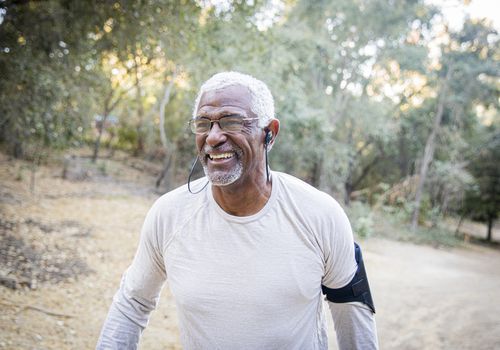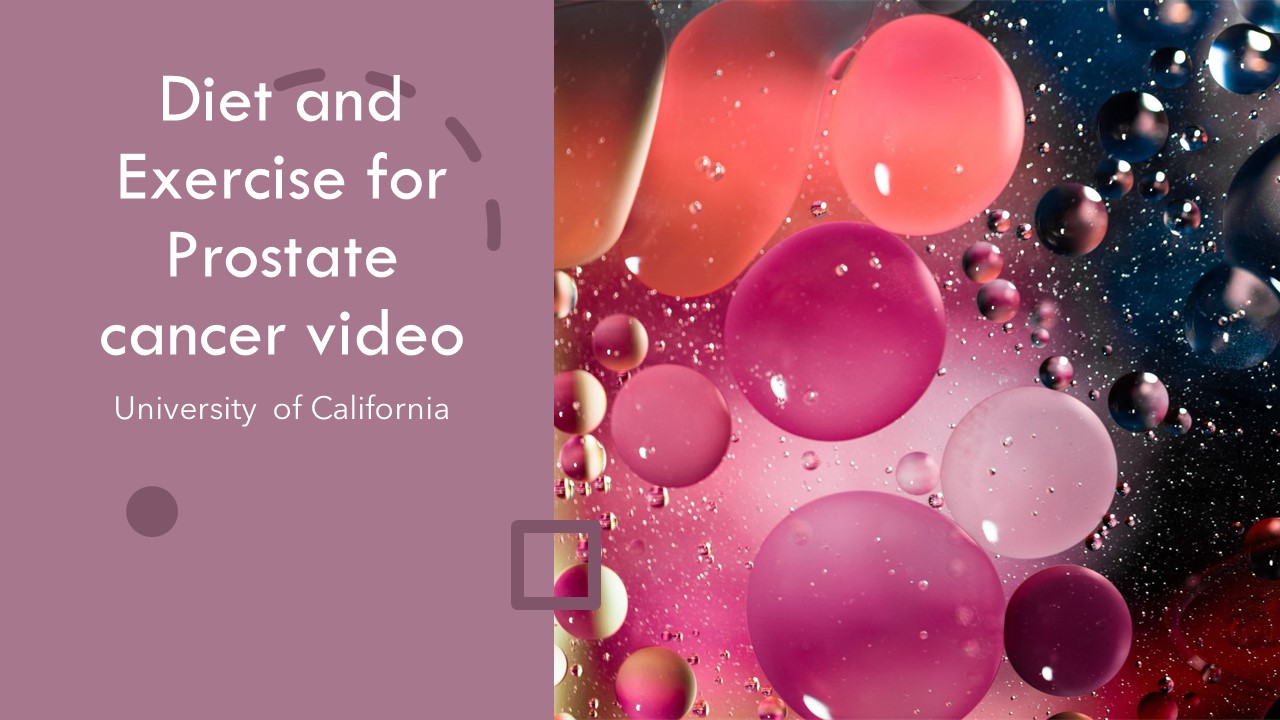Prostate matters is a not for profit organisation committed to providing free information about prostate issues from leading Clinical Authorities.
Prostate cancer – impact of diet and lifestyle

Overview by Mr James Duthie
Consultant Urological Surgeon
The Wellington Public Hospital
Wellington
New Zealand

Diet and exercise
Most men with prostate cancer are interested in what they can do to help themselves in terms of recovery from treatment and improving their prognosis. It is important to know that there is evidence for some dietary modifications and exercise regimes that do indeed reduce the risk of prostate cancer, improve outcomes after treatment, or both. Firstly, it should be noted that traditionally, most men with prostate cancer are at a higher risk of dying from heart disease than from their cancer. This is why Urologists carefully consider a man’s general health and life expectancy as well as the grade and stage of the cancer before embarking on treatment, and this remains true for many men after treatment. In terms of diet then, a good general rule is that if something is good for the heart, it is good for the prostate. The Heart Foundation dietary advice is a good place to start, and includes recipes and tips on replacing unhealthy foods with healthier options.
In addition to this general advice, there is evidence for some specific foods that may make a difference in preventing prostate cancer and/or affecting improving outcomes after treatment for it. The reason that we need to be cautious in attributing an anti-cancer effect to specific foods is that generating high-quality data on diet is a difficult process compared to a pill or operation, as it is almost impossible to be certain of what people are eating, and we know that our own recollection of our daily diet tends to be poor. As such, the quality of the data tends to be variable at best, and so we need to carefully weigh the evidence we have to avoid over-stating the effect of a given food.
Some men have no difficulty finding the motivation and energy to avoid unhealthy foods and perform regular, vigorous exercise. Given the international growth of obesity and sedentary lifestyles, it is safe to say that most men experience a gap between their intentions and actions. When reading the following advice, bear in mind that if you find changing your lifestyle difficult, you are absolutely normal. Not only do few of us achieve our lifestyle goals, many of us derive a lot of pleasure from the alternative of self-indulgence. Acknowledging this is a first step in making achievable, sustainable lifestyle goals. The good news is that doing something is better than doing nothing. A slow walk is not as good as a brisk one, but it is still better than sitting on the sofa. Equally, it is important not to deceive ourselves that we can undo the effects of a consistently poor diet with the occasional vegetable. We are changed by the things that we do consistently. Self-knowledge and realistic goals are the keys to improving your lifestyle.
Brassicas
Also known as the cruciferous vegetables, these include broccoli, cauliflower, spinach, chard, cabbage, and Brussels sprouts. There is a robust and increasing body of evidence that brassicas both reduce the risk of a number of cancers, and also improve the outcomes of men after prostate cancer treatment. If you find brassicas unappealing, they can be very finely chopped and added to stews or casseroles where they will be barely noticeable. Another easy way to increase brassica intake is to substitute side-salads for coleslaws which are based on cabbage.
Lycopene
Many people are aware of the fact that tomatoes may be good for the prostate, and this is due to the presence of a chemical called lycopene. There is evidence that a diet high in lycopene may both reduce the risk of prostate cancer and improve outcomes after treatment. Both tomatoes and watermelon are rich in lycopene, and interestingly lycopene becomes more easily absorbed by the body when it is cooked. Tomato paste and tomato sauce are probably the most easily available and richest sources of lycopene in the supermarket.
Coffee
There is some evidence that around 4 cups of coffee per day both reduces the risk of prostate cancer and improve outcomes after treatment, with the same effects produced with decaffeinated coffee. This means that while caffeine is not important, it is currently impossible to say which of the multitude of molecules contained in coffee is the key ingredient.
Foods to avoid
Processed meats – Cured, salted, and smoked meats increase the risk of a number of cancers, including prostate cancer, and may worsen outcomes after treatment. The best advice is to avoid these altogether or save them for special occasions.
High-fat, low-vegetable diet – There is increasing evidence that a diet high in fatty foods and low in fresh vegetables increases the risk of a number of cancers, including prostate cancer. In addition, it is well established that such a diet is harmful to heart-health. While there is no evidence that a strictly vegetarian diet is better than eating meat three or four times a week, certainly eating a diet based on consuming vegetables is desirable.
Normal weight
Having a healthy body mass index (BMI) is a part of good general health and reduces the risk of prostate cancer. Having too much abdominal fat can have a detrimental effect on recovery after surgery and can in some circumstances make surgery impossible. There is an enormous, often exploitative industry around weight loss gimmicks. While the idea of weight loss is pushed by groups that produce “junk” foods, the truth is that reducing the number of calories that we eat is vastly more important than exercise. Modern foods are so calorie rich that practically no amount of exercise can make up for careless eating habits.
The evidence suggests that there is no single diet that is effective for anyone, and that most people end up at the same weight by two years after starting any diet. The most important thing is to develop sustainable eating habits. It is worthwhile keeping track of what you eat with a food diary, and to have someone that you are accountable to in sticking to your goals. Joining a group of like-minded people is a great help. Considering having a “cheat meal” each week can make sticking to a diet plan easier for the other six days, providing a goal to look forward to and a sense of achievement.
Alcohol
The benefits of moderate alcohol intake have traditionally been exaggerated. While there may be little harm in having occasional alcohol, there is no need for anyone to start drinking alcohol for the sake of their health, and there is good evidence that a high alcohol intake increases the risk of many cancers, including prostate cancer.
Smoking
However bad smoking may seem to you, the truth is that it is probably worse than that. Smoking increases the risk of many cancers beyond just lung cancer and including prostate cancer. It also reduces fitness, increases the risk of post-operative complications, and impairs erectile function. If you are a smoker, the most important thing you can do to improve your health is to quit.
Supplements
The only supplement to be proven to reduce the risk of cancer in general is a low-dose multivitamin. The benefit is quite small, and perhaps negligible when compared to the benefits of quitting smoking, regularly exercising, and eating well. Most modern multivitamins have much higher concentrations of vitamins than those proven to be helpful, and we simply do not know if and how this may affect our risk of cancer. In terms of prostate cancer risk, while no supplement has been shown to reduce the risk, bith selenium and vitamin E supplements have been shown to increase the risk of prostate cancer, and should be avoided.
Exercise
There is no doubt that regular exercise is good for us in many ways. Mood, quality of life, life span, and even erectile function are all improved with exercise. Specifically in men with prostate cancer we know that “vigorous” exercise (meaning exercise that raises our heart rate, makes us breath faster, and makes us sweat) carried out at least three times per week for at least thirty minutes markedly reduces the risk dying of cancer compared to exercising less than one hour per week. This is an intriguing phenomenon, as we would expect exercise to reduce the risk of death from heart disease, meaning that men might be more likely to live long enough to die from prostate cancer. In fact, it seems that exercise has a specific anti-cancer effect. While this regimen gives the best outcomes in terms of life span and quality of life, there is also evidence that at least three hours of walking at 5kmph per week is better than nothing. With exercise, it seems that every little bit helps, and while not everyone can be a marathon runner, even men with mobility problems can benefit from making the most of the movement they have.
One particular group of men with prostate cancer who stand to benefit from exercise are men receiving hormone therapy. There are a range of potential side effects from hormone therapy that can affect both life span and quality of life. Almost all of these effects can be at least mitigated with exercise. Men taking hormone therapy can feel sapped of energy and motivation, and exercise can seem too arduous to attempt. While it is difficult to overcome this fatigue, the benefits are significant, and most men find that they have to “spend energy to get energy”. As with improving diet, having a supportive group of peers makes exercise habits easier to maintain and more enjoyable to carry out. Once again, achievable and sustainable goals are essential.
Mindfulness and Meditation
At present, the evidence for meditation or mindfulness strategies improving outcomes in men with prostate cancer is at best mixed. For every study that shows a modest benefit, there is another that shows none. This is not to say that it is not worth considering taking time to reflect, some men find this very helpful for relaxation and there is some evidence that meditation is beneficial outside of the cancer setting.
Wellbeing
The best studies on prostate cancer treatments measure quality of life as one of the markers of success. There is more to life than the next PSA test. Few men would knowingly strive for the longest possible life span with a poor quality of life, and so a considered approach to lifestyle is essential. If you get pure pleasure from a meat pie and a pint with friends, why would you not do this? On the other hand, if you knew that your daily mental and physical health would benefit from a change to more vegetables and some exercise most days, perhaps you would reserve the pint and pie for a weekend get-together. A cycle of routine discipline and regular treats is perhaps the most sustainable approach for most men, and much more achievable with a supportive network of friends and family.


Prostate matters is a not for profit organisation that is committed to providing free expert advice about prostate issues from leading Clinical Authorities
In memory of Riki
PROSTATE MATTERS
Copyright Disclaimer: We try to acknowledge copyright as appropriate. If we have used something without acknowledging copyright, this is inadvertent. Please let us know by emailing info@prostatematters.co.uk
Site design and technical development by Webtoys | Intelligent Digital Media


